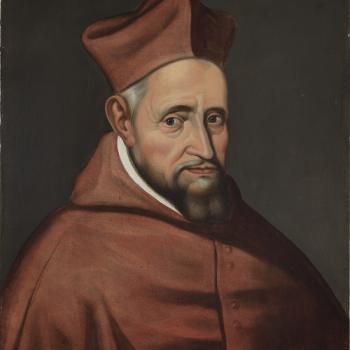Now Featured at the Patheos Book Club
The Holy Trinity and the Law of Three
Discovering the Radical Truth at the Heart of Christianity
By Cynthia Bourgeault
Book Excerpt
My first challenge in writing this book will be to persuade you that there is anything here worth considering at all. With so many urgent practical issues facing spiritual humanity, why waste time with the Trinity, a doctrine that most of the world (and even much of Christianity) regards as contrived and irrelevant? It takes a real stretch of the theological imagination to claim that it was ever a part of the original Jesus teachings or that it does a single thing to clarify or enhance these teachings. In fact, the eminent twentieth century theologian Karl Rahner has claimed that if the Trinity were to quietly disappear out of Christian theology, never to be mentioned again, most of Christendom would not even notice its absence!
By way of a circuitous response, let me offer you a story which was told to me by my longtime friend and teacher, the Abkhazian dervish elder Murat Yagan.
In the years immediately following World War II, Murat recounts, he spent a time ranching in a remote corner of eastern Turkey. There he became friends with an elderly couple, with whom he frequently shared a meal. Life had been good to them, but their one sadness was that they missed their only son, who had left some years before to seek work in Istanbul. Though he indeed had become a successful businessman, they had infrequent contact with him and missed him greatly.
One day when Murat appeared on their doorstep for tea, the old couple were bursting with pride to show him the new tea cupboard that their son had just shipped them from Istanbul. It was indeed a handsome piece of furniture, and the woman had already proudly arranged her best tea set on its upper shelf. Murat was polite but curious. Why would their son go to such expense to send them a tea cupboard? Why, for a piece of furniture whose ostensible purpose was storage, was there such a noticeable absence of drawers and cabinets? "Are you sure it's a tea cupboard?" Murat asked them. They were sure.
But the question continued to nag at Murat. Finally, just as he was taking his leave, he said, "Do you mind if I have a closer look at this tea cupboard?" With their permission, he turned the backside around and unscrewed a couple of packing boards. A set of cabinet doors swung open to reveal inside a fully operative ham radio set.
That "tea cupboard," of course, was intended to connect them to their son. But unaware of its real contents, they were simply using it to display their china.
To my mind, that is an unsettlingly apt analogy for how we Christians have been using the Holy Trinity. It is our theological tea cupboard, upon which we display our finest doctrinal china, our prized assertion that Jesus, a human being, is fully divine. This is not necessarily a bad thing, just as it was not a bad thing for the elderly lady to set forth her prettiest teacups on the new piece of furniture. But what if, unbeknownst to nearly everyone, inside it is concealed a powerful communications tool that could connect us to the rest of the worlds (visible and invisible), allow us to navigate our way through many of the doctrinal and ethical logjams of our time, and place the teachings of Jesus in a dynamic metaphysical framework that would truly unlock their power?
It's simply a matter of turning the tea cabinet around and learning how to look inside. That's what this I'm proposing to do in this book.
In a nutshell, I will claim that embedded within this theological formula which we recite mostly on automatic pilot ("In the name of the Father, the Son, and Holy Spirit") lies a powerful metaphysical principle that could change our understanding of Christianity and give us the tools so long and so sorely needed to reunite our shattered cosmology, rekindle our visionary imagination, and cooperate consciously with the manifestation of Jesus' "Kingdom of Heaven" here on earth. That principle is called The Law of Three, and the metaphysics that derive from it can be called "ternary metaphysics."
The Law of Three is, I believe, Christianity's hidden driveshaft, and its presence so far has been only intuited, never explicitly identified by theologians. It is distinctly different from the speculative formulations of Patristic theology, or even from the well-worn metaphysical roadmaps of sophia perennis (the "perennial philosophy") in which Wisdom alternatives to doctrinal orthodoxy are nearly always couched. Comprehensive, profoundly original, and like all driveshafts concerned with forward motion, it is Christianity's authentic temperament, the key in which theoria and praxis come together, in which all its teachings begin to hang together.




